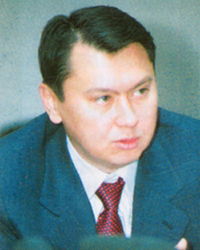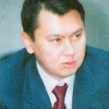
KAZAKH PRESIDENT’S SON-IN-LAW FACES CRIMINAL CHARGES
Publication: Eurasia Daily Monitor Volume: 4 Issue: 106
By:

On May 28 the Interior Ministry of Kazakhstan’s spokesman, Baghdat Kozhakhmetov, told journalists that Rakhat Aliev, Kazakhstan’s ambassador to Austria, was on the run from the law and he has been classified an internationally wanted suspect. Aliev is married to Dariga Nazarbayeva, daughter of Kazakh President Nursultan Nazarbayev.
Earlier this year Aliev was charged in connection with the abduction of top managers of Nurbank. On the night of January 18 Abilmazhin Ghilimov, the former chairman of the board of Nurbank, and his deputy, Zholdas Timraliev, disappeared under mysterious circumstances. Allegedly Aliev kidnapped the pair and bullied them into selling the bank’s headquarters and their business assets for a cut-rate price. On January 31 a group of unidentified armed men raided the Nurbank offices and kidnapped two more executives of the bank who disappeared without trace.
Despite repeated demands from relatives of the victims, no proper investigation into the case has been conducted. But the Interior Ministry recently launched a new probe into the mysterious case, which led to the arrest of dozens of suspects from Aliev’s entourage. Although four Almaty police officers found themselves in the dock on suspicion of organizing the January 31 raid, pro-government media sources have repeatedly implied that Aliev masterminded the operation. Kozhakhmetov subsequently urged journalists to refrain from biased interpretations of the case, as it hampers the course of investigation (Express-K, May 24).
The scandal around Nurbank and Aliev’s alleged involvement triggered a veritable media war. Ultimately the prosecutor-general’s suspended publication of the Aliev-owned Karavan weekly and took his KTK television channel off the air. Formally, the Prosecutor General’s Office explained the closure of Aliev’s media outlets as punishment for alleged violations of the language law.
On May 10 a gang of masked people broke into KTK’s offices and abducted two employees. The employees were interrogated by the Almaty police department. The next day, Aliev’s father, academician and renowned surgeon Mukhtar Aliev; the editor-in-chief of Karavan, Alexander Shukhov; and former National Security Committee chief Alnur Musayev released a press statement denouncing the pressure on Rakhat Aliev’s media outlets as “an agony of the system, bogged down in corruption and inebriated by unlimited permissiveness and impunity” (Megapolis, May 21).
In a last-ditch appeal to his “very numerous supporters” in Kazakhstan, Rakhat Aliev said that he had lobbied for Kazakhstan to assume the presidency of the Organization for Security and Cooperation in Europe (OSCE) in 2009 because he wanted to bring his country up to the democratic standards of European countries and to ensure transparency at the highest levels of power. He also said that he had been persecuted since informing Nazarbayev of his intention to run for the presidency in 2012. “The charges against me are fabricated and they are politically motivated,” he added. He believes that Kazakhstan will not benefit in any way from elections turned into a “political farce” and backtracking on democracy (www. Gazeta.kz, May 26).
The public is having difficulty understanding the situation regarding Nurbank and Aliev. The courtroom proceedings are shrouded in ambiguous terminology, media reports are incomplete and, more often than not, misleading.
In theory, the presidential son-in-law had no apparent reason to rebel against the president. Aliev is among the wealthiest individuals in Kazakhstan and had carved out a political career outside of the presidential court. He runs successful businesses both inside and outside of Kazakhstan, holding a 10% share in French Sucden sugar company and controls a network of sugar business in Kazakhstan. He is a co-owner of Nurbank and leads a powerful media holding group that includes Karavan weekly, KTK television channel, and the Kazakhstan Today news agency. However, the dramatic developments sparked by his unbridled ambition to vie for the presidency have likely put an end to his enviable career.
For Nazarbayev, the seemingly embarrassing situation around his son-in-law has its advantages. Aliev, rejected by the opposition as an outsider and ostracized by the establishment as a turncoat, now finds himself stranded in a political void. Raised in the rarified world of the well-fed, wealthy elite, Aliev can hardly count on public sympathy.
On May 26 Nazarbayev stripped his son-in-law of all his official functions. With the loss of these prestigious posts, Aliev has also lost immunity from prosecution. To the public, this resolute step may be interpreted as the president’s decision to assert the rule of law and back away from accusations of nepotism. It may also raise Nazarbayev’s political profile among the European community, although in essence the harsh treatment of Rakhat Aliev only reflects the intensity of the power struggle within the family and clears the way for Dariga Nazarbayeva, Aliev’s wife, or Timur Kulibayev, another presidential son-in-law, to vie for the presidency. At any rate, by getting rid of the rebellious and over-confident Rakhat Aliev, Nazarbayev and his family have very little to lose.




